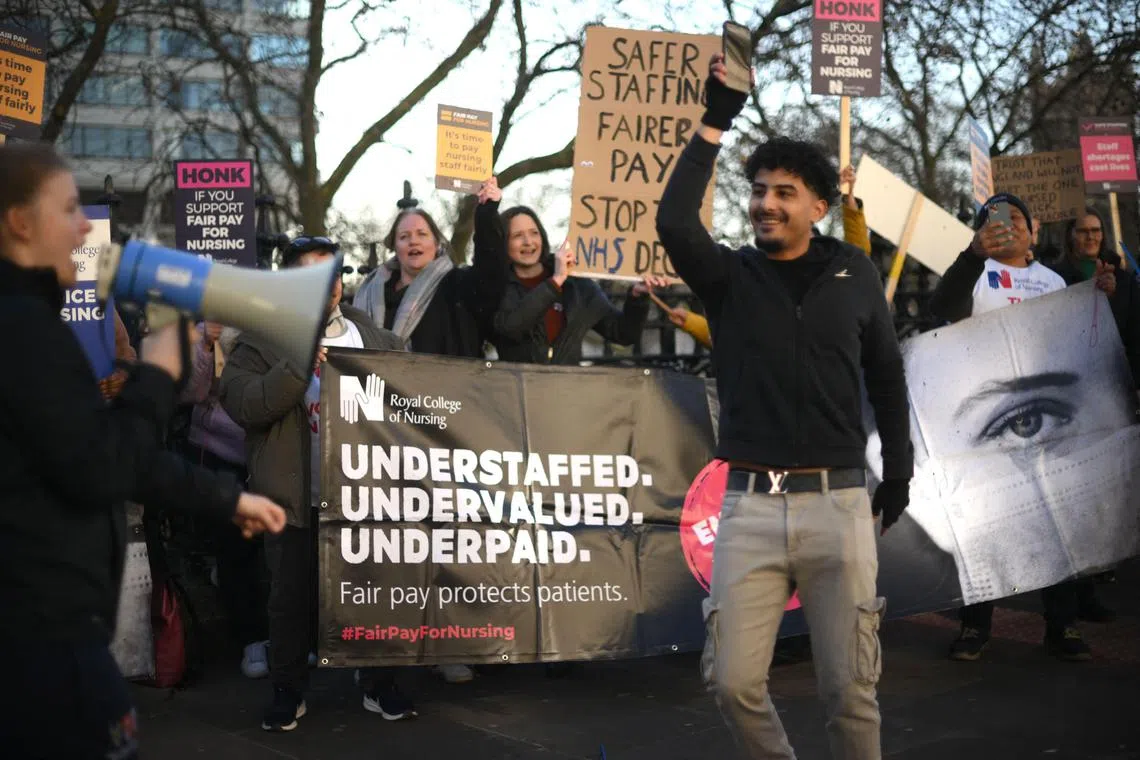Britain loses 2.5 million days to worst strikes since 1990
Sign up now: Get ST's newsletters delivered to your inbox

A total of 843,000 working days were lost due to labour disputes in December 2021, the worst month in more than a decade.
PHOTO: AFP
LONDON - The economy lost nearly 2.5 million working days to strikes last year as Britain suffered its most severe industrial action since Mrs Margaret Thatcher was in power.
The Office for National Statistics said on Tuesday that 843,000 working days were lost due to labour disputes in December, itself the worst month in more than a decade.
That took the total for June to the end of the year to 2,472,000 days lost. The last time it was worse was 1989-90, toward the end of Mrs Thatcher’s time as prime minister.
Unions are railing against pay offers that fall behind Britain’s rate of inflation.
Protests have escalated this year with major walkouts held by hundreds of thousands of rail staff, civil servants, teachers and workers in the National Health Service (NHS) and elsewhere in the public sector. On Feb 1, as many as half a million went on strike together.
The crisis looks set to worsen after the National Union of Rail, Maritime and Transport Workers (RMT) rejected another pay offer for rail workers at the end of last week, raising the prospect of more train strikes.
Nurses’ strikes extending over two consecutive days could become more common, according to reports.
“A continuous 48-hour strike that includes staff from emergency departments, intensive care units and cancer care services would likely have the biggest impact on patients we’ve seen,” Ms Saffron Cordery, deputy chief executive at NHS Providers, said in an e-mailed statement at the weekend.
Junior doctors are expected to vote in their thousands in support of strikes, with a ballot closing next week and industrial action due early March.
More ambulance drivers in southern England and Yorkshire also joined the wider NHS dispute over the weekend and will take part in upcoming strikes.
Prime Minister Rishi Sunak’s government has refused to lift public sector remuneration for the current fiscal year beyond levels proposed by pay review bodies that it insists are independent.
Unions say they will keep fighting, with rail workers and Royal Mail staff being re-balloted for the right to hold strikes into the summer and possibly beyond.
While the strikes may not have had a huge effect on gross domestic product, shops, bars and restaurants in city centres have suffered from disruption on the public transport system.
Footfall at shopping areas near central London offices was up more than 36 per cent year on year last week as commuters returned following train strikes at the start of the month, according to data company Springboard.
A year earlier, many Britons were still working from home due to the Omicron variant. BLOOMBERG


